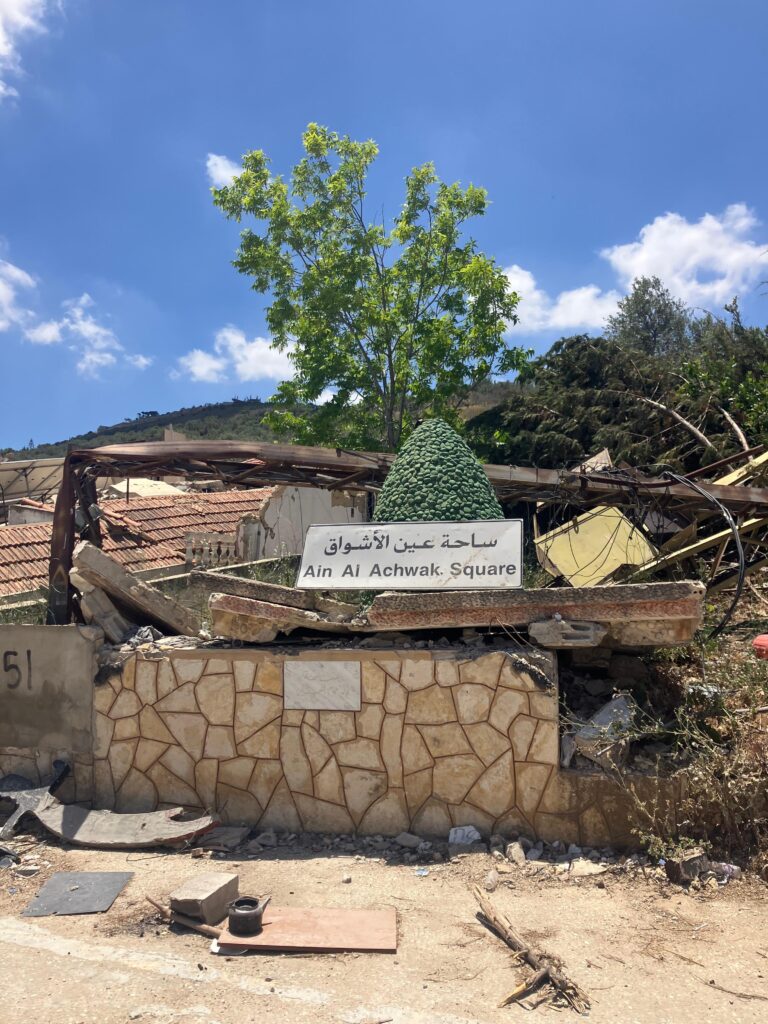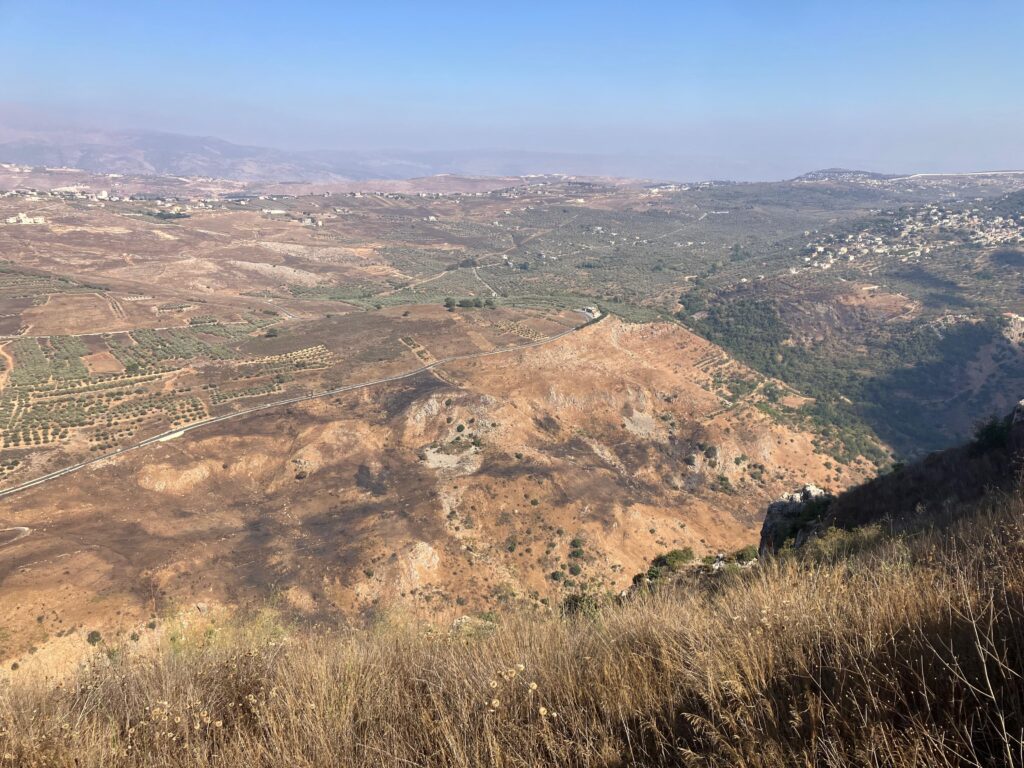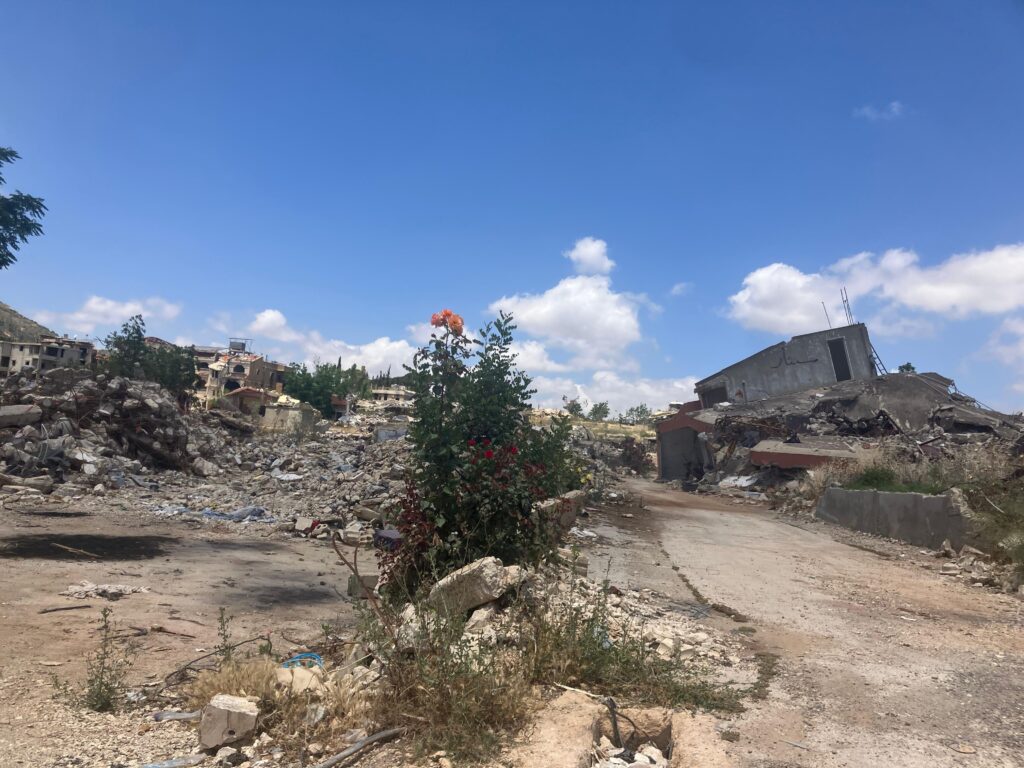In the aftermath of the 2024 full-scale Israeli war on Lebanon, individuals and initiatives are leading the rehabilitation of the agricultural sector by tackling the toxic contamination and its impact on the environment and human health.
The agricultural sector in Lebanon has been significantly devastated by the 2023-2024 Israeli war. The Food and Agriculture Organization of the United Nations (FAO) estimates $118 million in damages and up to $586 million in losses, with South Lebanon and the Bekaa Valley being the most impacted.
The war resulted in 6,000 hectares of damaged agricultural land, posing multi-faceted consequences such as decreased production, spiked labour costs, contaminated soil, water and vegetation, and life-threatening working conditions for farmers and agricultural labourers, as well as the local community. The destruction exceeds 2,192 hectares of burnt agricultural land, with disruption of agricultural activities in 130,000 hectares, according to a mapping report published by the National Council for Scientific Research (CNRS) in December 2024.
Chemically contaminated land and water
In the aftermath of the war, heavy metal and white phosphorus contamination pose environmental and health hazards on soil, water and crops. More than 195 incidents of white phosphorus shelling over 918 hectares of land were geolocated and verified over the 14 months of Israeli aggression by Ahmad Baydoun, a researcher working with Green Southerners, a Lebanese environmental organisation.
“It is very difficult and unsafe to collect samples with the ongoing Israeli military presence in border villages”, Ahmad tells AMWAJ Alliance. ”
Notably, Usama Farhat, a civil defence worker and Green Southerners volunteer, was killed while collecting samples following an Israeli airstrike that targeted the civil defence centre in Mays Al Jabal on 24 April 2025.
Israel used white phosphorus munitions against Lebanon during its five wars on Lebanon: in 1982, 1993, 1996, 2006 and most recently in the 2023-2024 hostilities.
According to Abbas Baalbaki, an environmental researcher specialised in the management of hazardous materials, white phosphorus-containing munitions are wrongly classified as an incendiary weapon. “They pollute the environment with highly toxic white phosphorus, which could remain in the soil for more than 10 years, a property of a chemical weapon,” he tells AMWAJ Alliance.
Baalbaki started testing samples in November 2023. Laboratory results have shown that white phosphorus felt wedges, when covered with soil and water, form an external layer that prevents them from further reacting with the air and becoming exhausted. As a result, the residues can stay in the environment for a long time. Considering that there are no global standards for surveying white phosphorus in the soil, Baalbaki developed an analytical protocol for its determination, as well as raising awareness and sharing disposal guidelines for the local community and farmers.
White phosphorus harms the environment and human health both short term and long term. It causes contamination of water and vegetation, potentially destroying crops and livestock, and intoxicates living organisms such as birds and cattle. For humans, it causes deep skin burns, acute respiratory problems, headaches, digestive issues, and burning in the eyes. Skin burns can reignite after bandages are removed, so scrubbing off the burnt area, which can cause skin deformation, is one of the only viable treatments.
In addition to phosphorus, heavy metals and toxic compounds were found in high levels in the soil of targeted areas, which impacts fertility and increases acidity. The presence of heavy metals in the soil is not new. A 2023 research study showed that it already existed in abnormal levels and is present in frequently consumed vegetables. Additionally, the prevalence of unexploded cluster bombs is a major concern. Substances such as barium, arsenic, lead, cadmium, and residues from explosives have also been found in the soil and vegetation with shallow roots.

Inaccessible and ploughed land
In the period following the 2023-2024 Israeli hostilities and the continued ceasefire violations, farming became a dangerous profession in South Lebanon and the Bekaa.
“Our 120 olive trees are gone, and our land was entirely burnt by white phosphorus”, Hadi explains.
Hadi, a young vermicompost farmer and member of a mutual support initiative in Kfarkela, a border village in South Lebanon, expresses how difficult and unsafe it is to return to farming in the decimated border village. “They can strike or shoot at any moment,” he tells AMWAJ. The majority of farmers whose land was heavily shelled and contaminated cannot access it in order to enumerate the losses. “Our 120 olive trees are gone, and our land was entirely burnt by white phosphorus”, Hadi explains.
Hadi describes the increasing fears of the residents of Kfarkela with every ceasefire violation, and how that pushed farmers to migrate to other safer villages in order to work. “Kfarkela is a village where people live, work and go to school. What we are seeing is a forced migration of an entire village and its farmers,” he adds.
Israel was still present in five strategic positions in south Lebanon nine months after the ceasefire went into effect. “The occupation and the ploughing of the land that the Israeli forces have conducted make it nearly impossible to perform adequate testing”, concludes Baalbaki.
Impact on agriculture
South Lebanon is a rich agricultural area with fertile soil and ideal conditions for a variety of produce. Olives and olive trees are among the most severely impacted by the hostilities, with an estimated 121 hectares and 47,000 trees destroyed. The tobacco industry has also taken a hit. Tobacco is the primary agricultural cash crop in the South, and production decreased by more than half due to the displacement of a large number of tobacco farmers. Agricultural infrastructure in the targeted areas has been fully or partially damaged, reducing access to clean water and electricity.
The livelihoods and health of agricultural workers have suffered. Many workers have symptoms of chemical exposure and are quickly replaced if they are unable to work. “The conditions are violent and unsafe on every level. Their health concerns often go unreported,” explains Mostapha Chbaro, an agricultural engineer working closely with farming cooperatives. The agricultural sector in Lebanon is marked an ingrained informality of labour conditions. Most workers of all nationalities are excluded from the Labour Code issued in 1946, and often work without social protection and with no access to healthcare benefits, increasing their vulnerability to work-related accidents, illness, economic crises, or conflict.
These damages are further compounded by the effects of climate change, and more specifically, the lack of precipitation in the passing winter that harmed the seasonal harvest and the farmers’ ability to produce. “We should not be preparing for climate change, we should act now because we are witnessing it,” says Serge Harfouche, the founder of Buzuruna Juzuruna in Saadnayel, an heirloom seed library and farm that provides local seeds to farmers and agricultural enterprises to reduce import dependency.
Harfouche describes how water scarcity and the high prices of fuel hinder farmers’ livelihoods and how non-governmental interventions don’t target the root of the problem: “It is no longer sustainable to only provide farmers with fuel or to help them multiply their produce.” Funds are directed mainly at capacity building, neglecting the needed resourcing of short-circuit economies that sustainably enable farmers to sell their crops in local markets, especially after the war.

The pressing need for decontamination and social protection
The war has devastated the land and its labourers in Lebanon in a variety of ways, making decontamination of the soil, rehabilitation of the sector, and social protection for agricultural workers extremely urgent matters.
Initiatives like SOILS Permaculture Association Lebanon are developing a bioremediation pilot test to map and survey heavy metal, biotoxins, white phosphorus and explosive residue samples collected from targeted areas in South Lebanon.
“We wanted to do this pilot before the escalation in September 2024 and to share the results with similar initiatives in Gaza,” explains Rita Khawand, co-founder of SOILS. The team, of which Hadi is a part, faces several obstacles in their work. Border villages are unsafe and accessing them can be life-threatening, so SOILS’ volunteers are working in areas north of the Blue Line, which is a line of withdrawal set by the United Nations in 2000 to confirm the withdrawal of Israeli forces from southern Lebanon.
The agricultural sector in Lebanon is marked an ingrained informality of labour conditions.
Additionally, funding the testing process is a significant challenge. The Lebanese government does not have the means and resources to conduct all kinds of soil testing, and private labs are expensive. “We are now trying to secure funding to start the pilot process and design a bioremediation strategy that can be implemented,” Khawand tells AMWAJ.
Several actions are required to rehabilitate the natural and human resources of the agricultural sector in Lebanon. A decontamination strategy involving chemical and nature-based methods is needed through multi-stakeholder collaboration between the Ministry of Agriculture, the Ministry of Environment, municipalities, local initiatives, and international organisations.

Early warning systems, awareness, and protective resources should be prioritised in order to protect human health. So should building the capacity of emergency crews when it comes to handling toxic residue and treating injuries. Farmers and agricultural workers, who are at high risk of exposure, are in dire need of social protection laws and policies reform to ensure on-site protection, healthcare benefits and dignified working conditions and wages.
Jawde Ammar, president of the Syndicate of Farmers and Agricultural Workers, tells AMWAJ that the syndicate is calling on the Ministry of Agriculture and the Ministry of Labour to reform the Labour Code of 1946 by including agricultural workers under the National Social Security Fund (NSSF) in order to protect them against work-related accidents.
This article was developed as part of the Climate Change and Environmental Justice Training Series organised by AMWAJ in partnership with the Heinrich-Böll Foundation Middle East.